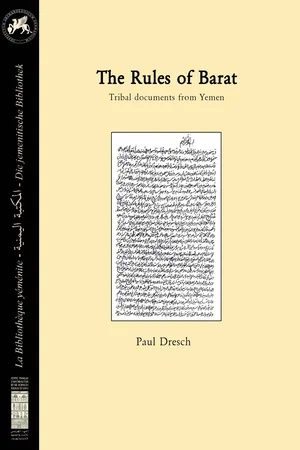
This is a test
- English
- ePUB (mobile friendly)
- Only available on web
eBook - ePub
Book details
Table of contents
Citations
About This Book
Paul Dresch Rules of Barat presents several eighteenth-century agreements among tribesmen from Jabal Barat, north-east of Yemen. These documents, previously unedited, shed new light on the history of customary law ('urf) in Yemen.
Frequently asked questions
At the moment all of our mobile-responsive ePub books are available to download via the app. Most of our PDFs are also available to download and we're working on making the final remaining ones downloadable now. Learn more here.
Both plans give you full access to the library and all of Perlego’s features. The only differences are the price and subscription period: With the annual plan you’ll save around 30% compared to 12 months on the monthly plan.
We are an online textbook subscription service, where you can get access to an entire online library for less than the price of a single book per month. With over 1 million books across 1000+ topics, we’ve got you covered! Learn more here.
Look out for the read-aloud symbol on your next book to see if you can listen to it. The read-aloud tool reads text aloud for you, highlighting the text as it is being read. You can pause it, speed it up and slow it down. Learn more here.
Yes, you can access The rules of Barat. Tribal documents from Yemen by Paul Dresch in PDF and/or ePUB format, as well as other popular books in History & Middle Eastern History. We have over one million books available in our catalogue for you to explore.
Information
Table of contents
- Cover
- Bibliographic informations
- First pages
- Notes
- Table of contents
- Foreword
- Introduction
- Part 1. The detailed setting
- Part 2. Customary law in context
- Part 3. Texts and translations
- End matter